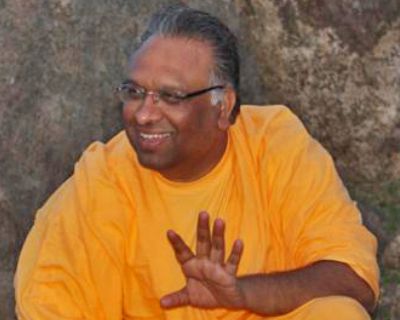There was this person I knew. He worked in the Government service for the minimum required time to avail monthly pension benefits, then took to Sannyasa. I used to wonder how this could even be termed Sannyasa. How could you secure yourself here, protect yourself from all the worldly forces, and then seek to know the Truth? In my mind, worldliness and piety can never go together! Either you are worldly in your thinking and feeling, or you are pious; you can never be both together.
Which simply means that the pious one is willing to lose here. Yes, there is the danger of being a loser here, and not achieving anything in the ideal or utopian world too. That fear is real and can stalk any pious heart occasionally and temporarily immobilise him.
Worldliness is when you know for sure that you have got to take care of yourself here, and that you can’t depend on anyone, including your parents or close relatives, to take care of you. And that you must win ultimately, never lose! This vigilance itself is worldliness. You need something to latch on to here, to survive, and thrive. Money, Talent, Relationship, Position, Inheritance, Belief, Identity, Territory—anything will do. Once you find it, then you will have to protect and take care of it for a lifetime. This is worldliness, in short. If you didn’t do this, you would be ransacked by fear.
Fear of what? Fear of what this world will do to you, how it will treat you! Consider this. If I fear this world, and I need to do something here to survive its consistent threat, I can’t really contribute to the very same world, can I? In other words, you can contribute to a family only when you experience a sense of assurance that the family will not desert or sideline you. If you become redundant and the family easily exists without you, you are back to square one—insecurity and loneliness!
In a manner similar, the one who seeks to establish himself in this world through a plan, talent, capability, fierce independence, plot etc., can hardly contribute to this world. He can, at best, serve himself and not the world. He could be serving his image, creating a territory or fiefdom for himself, or building a stainless reputation in the name of working for society. Isn’t this simple enough to see?
Piety (or साधूपन) is exactly in the opposite direction. You don’t begin with calculations about the world, situation, circumstance, or people, which makes you come up with a plan or strategy. Instead, you trust and go ahead. Yes, you will likely be naïve and lose in the process. But you learn something profound and essential about the very nature of this creation through those heartbreaks and disappointments. Piety doesn’t resort to strategy and calculation even in dire circumstances. If you took to Plan B, which is strategy and selfishness, in case goodness didn’t work, then that is not being pious.
Returning to the example I began with, why not go for it directly if you seek to know the Truth of this world? Why make an assessment about the spiritual path being difficult, or that it may take many years of toil, and therefore, it is better first to create some sort of security deposit for yourself, and then commit to the path of Truth? Do you get the fear and calculation here? That won’t take you to the Truth ever; it will only make you calculate and manage forever.
You can’t fear the world and yet launch a path that will eventually make you see the world itself as God, can you? Do you see the inherent contradiction?
Piety is not sacrifice either. Deeming all worldly pursuits like marriage and profession lower, and sacrificing them to take to the higher is not the route piety takes at all. Neither does it mean renouncing worldly fields, saying you are made of far better stuff and that your ego’s glory lies elsewhere. Such ‘power attitudes’ and piety lie in precisely opposite directions.
In other words, piety is that which sees no meaning in any form of self-assertive power. Therefore, it isn’t interested in combat, battle, competition, comparison, envy, jealousy, desire, or any form of relative achievement.
Most importantly, piety is the absence of fear. Fear of this world, fear of the unknown, fear of different kinds of people, fear within relationships, fear of money and politics, fear of big scale, fear of abandonment, and so on. Since you are free of fear, you don’t begin from strategy or plan or plot. You start with trust and goodness. Your eyes aren’t scanning the other for motives; instead, you get in and get along right away. You are not waiting for some undercurrents to settle down, for equations to change your way favourably. In other words, nothing stops you from getting in right away with trust, love, and goodness.
Of course, you could be colossally wrong about the whole thing. You could make horrendous mistakes. You could cause embarrassment not just to yourself but for others too. You could mess it up, sometimes irreversibly. You could cause losses to many calculating individuals out there.
Consequently, many would be unwilling to bet on or back you precisely because you are not smart. None of these can soil true piety. You will learn what is to be learnt. You will easily own up the consequences of what you have done and apologise or do good to settle it for them. But nothing will corrode the quality of trust in your heart. Nothing will make you turn worldly. Then alone are you pious.
Piety and worldliness don’t go together. Piety and fear of the relative world don’t go together. Piety and surrender to God go well with each other. Piety and learning, whether secular or sacred, go well together. Piety and true love between man and woman go very well together. Piety and all the arts and sciences go well with each other. Piety and people, when they connect to each other through the heart, go very well. Piety and glorious action go very well with each other. Piety is the right gate pass to the higher, in fact. Inherently, since piety can go well with so many, it loses its naivety quickly.
The pious man understands this world, its systems, its cultures, the people and how they deal with each other, much better than the crafty and smart man.
There is only one problem with piety, though. If you have found it necessary to deal with the world on its terms, like dealing with the bad by being bad, if you have thought it right to give it back to those who think too much of themselves, if you are too keen to either fight or teach lessons to big and fat egos here, if you have known that negative energies like jealousy and greed have greater power and conviction ability than positive energies like merit and noble intent, then, you can’t switch over to piety directly at will.
Piety demands that you return to innocence fully, and then restart life from piety.
This is why a worldly-wise man or even an outstanding achiever has no entrance into the higher. Because they have, for long, invoked short-term high voltage energies, seeking to empower themselves quick- ly, keen to create an immediate impact upon the world; they have lived with these energies for way too long.
Piety begins with an utterly different energy. Its enthusiasm is of a completely different texture and quality. Its innocent wonderment is miles away from the hunger for facts and knowledge. Its produce is very unlike the outcomes achieved by aggressive targets and efficient means.
When you are young, it is assumed that you have not yet been consumed by worldliness. But the lure of success here, and the enjoyment that accompanies success shall pull you. If you are pious, you can easily see through these capti-vations. But, as you age, if you find it necessary to be worldly to deal with the world on its terms, you will increasingly turn corrupt. And you may reach a point of no return. Not that you are wrong or evil; you may still be a lawabiding citizen, doing everything well within your rights. But the amount of baggage you must shed to return to the true path of life becomes so heavy and uncertain, that you would rather continue being worldly, despite it being mediocre and tasteless.
The day you lose your return path to innocence, consider that to be the day you have punished yourself with the curse of inertness. You have lost access to piety forever.








